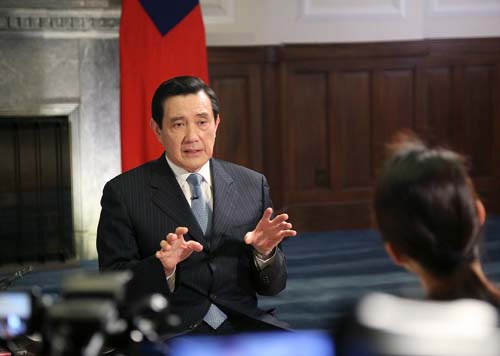
Ma’s mainland visit connects common emotions and historical memories of compatriots across Taiwan Straits
Hu Xijin
Former Taiwan regional leader Ma Ying-jeou paid a visit to the Dr. Sun Yat-sen Mausoleum in Nanjing on Tuesday morning, wrote “strive for peace, revitalize China” and showed it to reporters. Ma is the first former Taiwan regional leader to visit the mainland after leaving office. Without doubt, we should welcome him. We hope this visit will have various positive effects. At the same time, we should objectively see this visit and not overestimate its significance. Cross-Straits relations have been tense due to the Democratic Progressive Party, with incitement of US behind the scene. The visit of Ma, as a former regional leader of Taiwan, cannot substantially ease this tension. We should have a pragmatic judgment on this.
Ma’s itinerary for this visit includes Nanjing, Wuhan, Changsha, Chongqing, and Shanghai. Among these places, Xiangtan, Central China’s Hunan province is Ma’s ancestral home, Wuhan is where the Wuchang Uprising of the Chinese Revolution of 1911 took place, Nanjing used to be the capital of Chiang Kai-shek’s Nationalist government, and Chongqing was the wartime capital of the Nationalist government during the War of Resistance Against Japanese Aggression. Ma will visit places such as the Memorial Hall of the Victims in Nanjing Massacre by Japanese Invaders, the Memorial Hall of the Wuchang Uprising in the Revolution of 1911, the tomb of Zhang Zizhong, a general killed in the War of Resistance against Japanese Aggression. These places will connect the common emotion and historical memories of compatriots on both sides of the straits.

What “Taiwan secessionist” forces most want to cut off is the common emotions and memories between the people on the island and the mainland. In last year’s October 10 speech, Taiwan regional leader Tsai Ing-wen did not even mention Revolution of 1911 or Sun Yat-sen, as if the so-called “Republic of China” emerged out of nowhere. Ma’s visit is a strong reminder that the two sides across the Taiwan Straits belong to one and the same China and people on both sides of the Taiwan Straits are all Chinese people. It can even be seen as a declaration. In addition, Taiwan’s youth accompanying him will communicate with mainland students in several universities, which is very conducive to enhancing mutual understanding and feelings between the youth on both sides of the straits.
During Ma’s tenure, the two sides achieved the first meeting between leaders across the Straits, which was a major breakthrough. After leaving office, he expressed his desire to visit the mainland, but due to the three-year exit restrictions period and the prolongation of the restrictions by the DPP authorities, his ancestral worship trip and communication trip did not realize until today after the pandemic has passed.
Ma did not come to Beijing on his first mainland visit, which shows his unique prudence in the political atmosphere on the island. The political situation on Taiwan island is highly complex, not only involving internal struggles but also deeply affected by US intervention and influence. The evaluation of political figures on the island from the mainland’s public opinion should refer to local coordinates, and we should form an objective and pragmatic attitude. Regarding Ma, we should not view him as a hero promoting the reunification of the two sides, holding unrealistic expectations of him. Nor can we rudely accuse him of being more sinister than the DPP and believe that his actions are intended to “delay the reunification of the two sides” and “confuse” mainland society. Such evaluations are too extreme.
Ma Ying-jeou is just Ma Ying-jeou. His emotions and attitudes toward Chinese history and culture are sincere, and many of his words and actions point to a positive direction for cross-Straits peace and reunification. However, his personal influence is limited, and the overall direction of cross-Straits relations and the pace toward unification require effort and planning from the mainland. We should support the pro-unification forces on the island while seeking the support from those who stand in the middle ground. We must also firmly fight against the US on the Taiwan question and weaken its incitement of the secessionist forces on the island. We must be clear that there are certain things that must be done by the mainland and cannot be expected to be done by the forces on the island.
This Wednesday, Tsai will begin her “transit” visit to the US and meet with US House Speaker Kevin McCarthy. Ma’s visit to the mainland for ancestral worship and communication stand in stark contrast to Tsai’s trip to the US, highlighting the positive significance of Ma’s visit to the mainland. As a mainland media professional, I wish Ma a smooth and successful visit to the mainland.
The writer is a commentator with the Global Times
